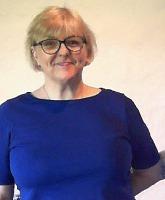Judith Carr is the Research Data Manager at the University of Liverpool. She attended IDCC 2020 with support from the DPC's Career Development Fund which is funded by DPC Supporters.
First of all, I need to thank the Digital Preservation Coalition for giving me the opportunity to attend my first IDCC conference.
Despite the crazy weather, hail, rain, sunshine, thunder and wind, sometimes in the same afternoon (just Dublin weather apparently), I enjoyed the conference. There were many interesting talks and workshops.
Kostas Glinos gave the keynote speech on the second day, 'Making Open Science the new normal'. Kostas is the Head of Unit for Open Science at the European Commission.
'Making Open Science the new normal' seemed to me to be a natural follow on from the first keynote, 'The Internet of Things: Utopia or Dystopia'. Our digital lives and the Internet of Things throws up so much for us to think about and being 'open' is surely one of the 'routes' to make IOT work well.
I should point out for those of us based in the UK, ‘Science' in this context means research. In the UK we talk about ' Open Research'; our European colleagues are not focusing on STEM subjects, Open Science for them refers to all research. This makes promoting the message in the UK more of a challenge, unfortunately. Just a small word change, but in different contexts, the different interpretation has such a bearing. A topic I will return to in my second blog about the conference.
The overall message from this talk for me was, the European Commission is totally behind the development of an Open Science culture but it will take time and commitment.
The European Commission realises that supporting open science will mean a change of culture, remodelling the research process to reward and encourage being as open as possible.
Horizon Europe is the next research and innovation framework programme announced by the European Commission to succeed Horizon 2020.
Europe has been promoting and supporting open access since 2008 and the completion of data management plans since 2014. Now from 2021, in the Horizon Europe framework, there are likely to be more stringent proposals about making journal articles open. For projects that generate, collect or reuse research data, not only will data management plans be compulsory but they will also have to address FAIR data principles. All data should be open by default. Other digital outputs need to be managed as well, not just digital data but software, code, protocols, workflows and models. With the added aim that machine actionability should be key to allow external services to link, creating a web of linked research data and digital outputs.
To do this, research practise needs to change, and this is supported by incentives. Extra credit for researchers, groups and projects that practise open science, the development of article-level and societal impact metrics (no reliance on journal impact factors), and incentives for training
As this is a blog for the DPC, what about digital preservation?
Well, there was no explicit mention of preservation in this talk. However, the European Commission is developing the European Open Science Cloud. A trusted space for researchers to store their data and to access data from researchers from all other disciplines. Something like this on a European level is going to be complicated and take time.
If institutions/researchers are going to engage with the EOSC then eventually someone will mention preservation. Questions of storage result in questions about costs and storage space and that will lead to issues of curation and preservation.
Making open science the new normal is going to take time. When you start to think about being 'open' you start to think about managing data and its long-term storage. Then come questions of cost, it was clear from Kostas’s talk that the Horizon Europe framework will expect there to be costs, that it is worth incurring such costs.
I am a research data manager and do not feel that my institution can ask for research data to be kept for a minimum of 10 years, and support other policies that require longer if we do not endorse and facilitate digital preservation. It is perhaps too complicated a conversation to have yet when the concept of ‘open’ and sharing is so new, but that is not to say I do not want to put it on the agenda.
It is very encouraging to see such support for open science from our European colleagues. According to Google research about how long it takes a person to form a new habit, to find a new normal, is divided. All I know is, it is going to take much longer for open science.
The Career Development Fund is sponsored by the DPC’s Supporters who recognize the benefit and seek to support a connected and trained digital preservation workforce. We gratefully acknowledge their financial support to this programme and ask applicants to acknowledge that support in any communications that result. At the time of writing, the Career Development Fund is supported by Arkivum, Artefactual Systems Inc., CAE Technology, Formpipe, Libnova, MirrorWeb and Preservica. A full list of supporters is online here.






































































































































